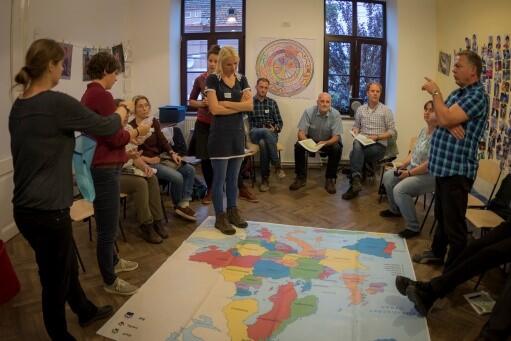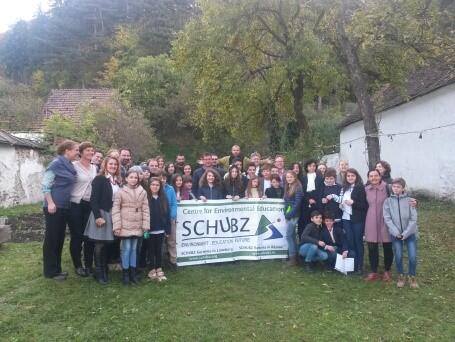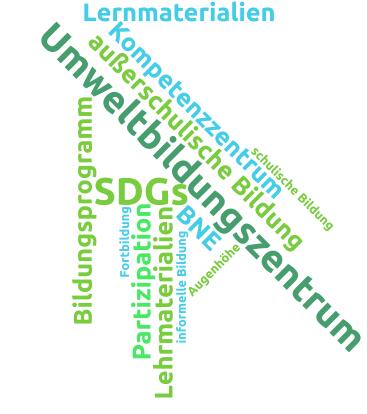Rosenau environmental education and ESD competence center (Romania)
International project funding
Subject and goals of the project
The project focused on the content and didactic design of the first Romanian environmental education center as an ESD competence center in the city of Rosenau, Transylvania, Romania. The goal was to establish the education center as a provider of educational programs and educational materials and as a training institution in the formal and informal sector for the integration of Education for Sustainable Development (ESD) in Romanian schools and extracurricular programs. In addition, a permanent international network between Romanian and Lower Saxon environmental education centers and out-of-school learning sites should be created for mutual professional exchange, for example in workshops or in summer schools.
In a 22-month pilot phase, educational programs were developed for the environmental education center in Romania and tested regionally with pilot groups at schools, among others. This was done in close exchange and constructively together with German education actors. The educational programs focus on the Sustainable Development Goals (SDGs) "Life on Land" (protected areas, forest ecosystems, animals, plants, etc.), "Life under Water" (flowing waters), "Clean Energy and Climate Change" (renewable energies, climate change/climate change adaptation) and "Drinking Water and Sanitation" (water as food, quality and influencing factors). In addition to actors from school-based education for sustainable development, education experts from the non-school sector also contributed to the project. A total of eleven educational programs were developed and materials for pupils and handouts for teachers were produced. Mobile tool boxes make it possible to work on the topics outside SCHUBZ România and can be borrowed. Due to a nearby branch of the educational center in the vicinity of a touristically attractive castle, the educational programs also reach families and tourists in the vicinity of the center. An interdisciplinary project advisory board consisting of representatives of educational practice, economy, nature conservation administration and science accompanied the process professionally.
Innovation and exemplary nature of the project
The project broke new ground in education for sustainable development in Romania by establishing for the first time an ESD competence center in Romania based on the concept of the School Biology Center and Regional Environmental Education Center Lüneburg (SCHUBZ). Aspects of an academy operation for the field of environmental education and ESD as well as concrete educational offers for pupils and tourists were realized. The programmatic orientation of the center and the cooperation between NGOs, universities, protected areas and German environmental education institutions were able to provide important impulses for the education of teachers and the further development of environmental education and ESD in Romania. During the project period, 1,200 students from grades 1 to 8 could be reached. Due to the acquisition of supporters and sponsors during the project period, SCHUBZ România can continue to operate beyond the funding period. The environmental education center is an important step towards the implementation of ESD in schools and extracurricular activities in Romania.
Special aspects of the project
The project had a sustainable impact beyond the project period. The project was characterized by a participatory structure – all measures were implemented on an equal footing in cooperation between Romanian and German actors. Local and language knowledge as well as intercultural competences of the applicants were very helpful.
At the same time, the project included aspects of education, training and capacity building. In the field of education, the project also created an economic basis for educational services in the region; the programs can be used as a service, can be booked in tourist contexts and also offer great added value in terms of content for the Scoala Altfel, the project week for extracurricular learning prescribed in the Romanian curriculum.
Funding subject: Tools and competencies for sustainability analysis, increasing sustainability awareness and promoting action
Applicant:
- SCHUBZ – Environmental Education Center of the Hanseatic City of Lüneburg, Lüneburg, Germany
- Asociatia Mioritics, Constantza, Romania
Associated partners:
- Municipality of the city of Rȃșnov (Rosenau), Romania
- Piatra Craiului National Park Administration, Romania
Location: Romania
Funding period: July 2014 to December 2016
Project costs: Total volume: 136 925 Euro, DBU funding: 123 565 Euro
DBU-AZ: 31608
Note: Translation of the German version with DeepL
Last updated: 09.11.2021




